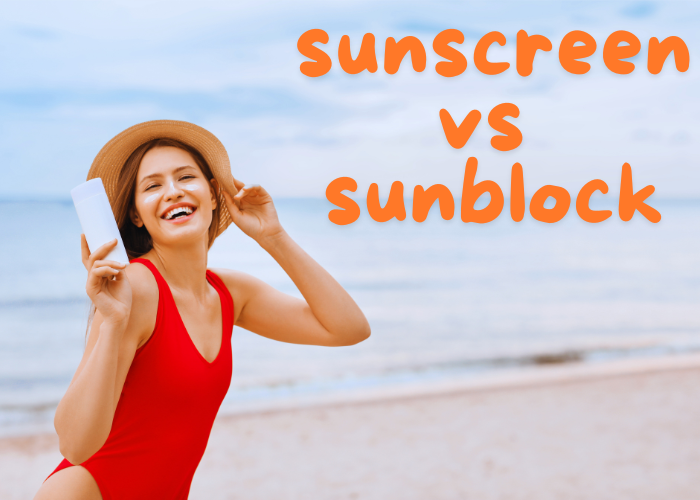Sunscreen Vs Sunblock: Have you ever found yourself puzzled by the terms “sunscreen” and “sunblock”? As you browse shelves or scroll through social media, these products are constantly touted as must-haves for your skincare routine. But do you know the distinction between the two? And if there is one, which option should you opt for? What’s more, what exactly are these products designed to do? Do not be afraid, we’ve got the answers you seek!
The purpose of this blog post is to explain the differences and similarities between sunscreen and sunblock. Here’s everything you need to know. This blog will help you understand and deal with sunscreen vs sunblock finally!

The Real Difference: Sunscreen Vs Sunblock
Both sunscreen and sunblock protect against the sun’s harmful UV rays, although they employ distinct approaches.
Sunscreen is a chemical defense that absorbs UV radiation before it reaches the skin. Hey, so this stuff has active ingredients like avobenzone, oxybenzone, and PABA. These ingredients take those UV rays and turn them into heat. And then your body just releases that heat. Easy-peasy, right?
Sunblock is a physical barrier that reflects and disperses UV rays away from the skin. Active ingredients such as zinc oxide or titanium dioxide are frequently included in its formulation. By effectively adhering to the skin, these powerful components create a robust barrier that shields and safeguards.
Similarities: Sunscreen Vs Sunblock
Despite their differences, sunscreen and sunblock share some similarities.
- Both protect against UVA and UVB rays.
- They are available in various forms like lotions, creams, gels, and sprays.
- They are labeled with SPF (sun protection factor) to indicate their effectiveness.
It is important to keep in mind that reapplication is necessary, particularly in the event of swimming or sweating.
Ingredients In Sunscreen:
Sunscreen is like a team of superheroes for your skin, protecting it from the sun’s harmful rays. These superheroes, or chemicals, in sunscreen, work together to absorb the sun’s rays, keeping your skin safe. Think of them as your trusty bodyguards during sunny days.
You’ll often find two powerful ingredients in sunscreen: avobenzone and oxybenzone. These active ingredients are the ones that do the heavy lifting in keeping those UV rays away. But hey, some folksSunblocknts in Sunblock
Ingredients in Sunblock:
Sunblock is like a mighty shield against the sun. It creates a protective barrier on your skin, reflecting those UV rays away. No absorption here, just pure defiance!
When it comes to sunblock, the dynamic duo of zinc oxide and titanium oxide are the stars of the show. These powerful ingredients give sunblock its strength in defending your skin.
Which Is Better to Protect Your Skin?
The thickness of the sunblock gives you a clue of what you are going to use as jelly, cream or lotion. It is rich in substance, and they owe it to zinc oxide as well as titanium oxide. The thickness of the substance differs from sunscreen and is an asset for people with sensitive skin. These ingredients are non-comedogenic, meaning they cause less skin irritation when applied compared to the sunscreen ingredients.
Don’t worry about the thickness of the sunblock. Despite being thick, it provides excellent protection from the sun.
In general, sunblock is more opaque, so it’s visible on your skin. Not everyone may find it appealing, but there’s no need to worry. Many brands provide discreet options, allowing you to protect your skin without compromising on style.
The choice between sunscreen and sunblock depends on various factors, such as skin type, age, and sun exposure.
When looking for sunscreen, it is recommended to choose a sunblock with zinc or titanium dioxide as it is often better for sensitive skin.
Sunblock is recommended for children and those with skin conditions like rosacea or allergies.
Sunscreen is suitable for most people and provides a more natural look without leaving a white cast.
Broad-spectrum sunscreen or sunblock with an SPF of 30 or higher is generally recommended for optimal protection.
How to Choose the Perfect Sunscreen
Choosing the right sunscreen can be tricky, but it’s essential for protecting your skin from the sun’s harmful rays. Here are some tips to help you pick the perfect sunscreen for your skin type and lifestyle:
Consider Your Skin Type
- For oily or acne-prone skin, look for a lightweight and non-comedogenic sunscreen.
- If you have dry or sensitive skin, choose a moisturizing sunscreen with ingredients like hyaluronic acid, glycerin, or ceramics.
- For combination skin, use a sunscreen that is lightweight and non-greasy but provides enough hydration for dry areas.
- Avoid sunscreens with zinc oxide or titanium dioxide if you have dark skin, as they can leave a white cast.
Check the SPF level.
- Opt for a sunscreen or sunblock with a minimum SPF of 30 for daily use.
- For extended periods in the sun, opt for a higher SPF.
Look for Broad-Spectrum Protection
- Ensure sunscreen or sunblock protects against both UVA and UVB rays.
- This will help prevent sunburn and premature aging, and reduce the risk of skin cancer.
Consider Your Lifestyle
- Choose a water-resistant sunscreen or sunblock if you’re going to be outside or in the water.
- When you sweat or come in contact with water, the product will stay on.
- Apply sunscreen a generous amount of sunscreen at least 20 minutes before going out into the sun. Reapply every 2–3 hours, especially after swimming or sweating. To fully protect yourself from the sun, it is essential to seek shade, wear protective clothing, and minimize direct sun exposure during peak hours.
Can You Use Sunblock Instead of Sunscreen on a Daily Basis?
Yes, of course! It’s great to protect your skin from the sun with sunscreen and sunblock. However, a sunblock might be the more suitable choice for everyday use.
A sunblock provides a physical barrier that stays effective until you wipe it off, while sunscreen may need to be reapplied more frequently.
Sunblock won’t irritate your skin or cause allergic reactions, so it’s safer to use every day.
However, sunscreen is lightweight and absorbs easily into the skin, making it more comfortable for everyday wear.
Conclusion: Sunscreen Vs Sunblock
In conclusion, understanding the differences between sunscreen vs sunblock is crucial for selecting optimal sun protection. Sunblock is better for sensitive skin and everyday use compared to other products due to its unique mechanisms and benefits. Always opt for a broad-spectrum sunscreen or sunblock with an SPF of 30 or higher for optimal protection.


